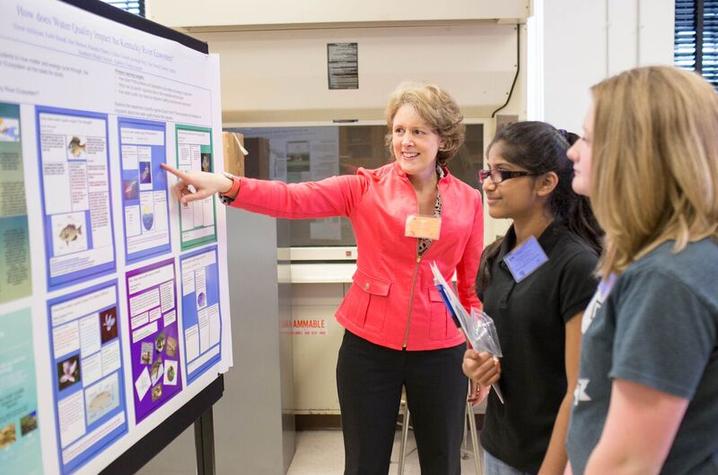College of Education Demonstrates Watershed Science to Middle School Teachers

LEXINGTON, Ky. (May 11, 2016) — Young schoolchildren are often amazed the little stream by their house eventually flows into the Kentucky River, then the Ohio and Mississippi rivers, all the way down to the Gulf of Mexico. It opens their eyes to how their actions impact water quality, said Rebecca Krall, associate professor in the University of Kentucky College of Education Department of STEM Education. She leads a $260,000 Kentucky Council on Postsecondary Education grant funding professional development for middle school teachers to implement investigations on local watersheds.
Krall grew up on a Pennsylvania farm that depended on well water – a finite source, heavily impacted by actions her family took to keep it clean and plentiful. During high school, her bus would cross a bridge spanning water that flowed bright orange, due to runoff from a nearby plant. And, later, as a high school teacher in Virginia, she saw water quality issues heavily promoted due to the many people who depend on the Chesapeake Bay for their livelihood.
“When I got to Kentucky, I thought we probably need to make the watershed more apparent to the residents around it,” she said. “Many students, and even adults, don’t think about where their drinking water comes from. When we do, it makes us think more carefully about what we put into it.”
Kentucky middle school teachers in school districts near a watershed are targeted for the training. During a five-day institute during the summer, they spend significant time in the field learning to collect water samples and do basic testing. They analyze EPA and state data, and look for patterns of issues that might be happening. This begins the process of helping their students come up with questions about their own sub-watersheds.
It is a bonding experience for the middle school teachers, some of whom have never had the chance to attend a science teacher’s conference. Because of the professional development grant, many of them have traveled with UK faculty and graduate students to state and national conferences, and are in regular contact with one another. Some of their middle school students came to UK recently to present their projects in a research university setting.
“The teachers report experiences where students not interested in science become much more interested in this project because it deals with their own community,” Krall said. “They are exploring the world around them and learning things they never knew before.”
The project is not only creating watershed awareness in Kentucky, but also helping teachers discover what true “project-based learning” means, and how valuable this way of teaching can be.
“At the end of our training, UK doesn’t give the teachers a packet that says ‘Here’s your unit, go teach it,'” Krall said. “We come up with an overarching question, but teachers go home and work with their students to develop locally-specific questions about watersheds. Our training helps demonstrate the structures that must be built within the projects they come up with. It’s a misnomer for teachers that ‘project-based’ means asking a question and having students explore without structures within. There is a lot of scaffolding involved that helps students understand the work and why they are doing it.”
UK is the University for Kentucky. At UK, we are educating more students, treating more patients with complex illnesses and conducting more research and service than at any time in our 150-year history. To read more about the UK story and how you can support continued investment in your university and the Commonwealth, go to: uky.edu/uk4ky. #uk4ky #seeblue
MEDIA CONTACT: Gail Hairston, 859-257-3302, gail.hairston@uky.edu




